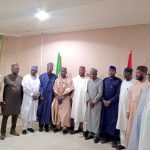Professor Yusuf Usman has long been a fearless critic of governance failures in Nigeria, consistently advocating for transparency and accountability. Since his return to the country under President Buhari’s administration—where he was appointed as the Director-General of the National Health Insurance Scheme (NHIS)—his principled stance has set him apart. However, the very system that brought him back to serve did not anticipate his unyielding commitment to integrity. Rather than being a tool for entrenched interests, Professor Yusuf refused to compromise, exposing deep-rooted corruption within NHIS and sparking a national conversation about institutional decay.
His outspoken stance put him at odds with powerful figures who sought to silence him. The resistance he faced only solidified his reputation as a courageous public servant determined to serve the public good. His transition from a distinguished academic and medical professional to a formidable public commentator has made him a sought-after voice in the media, particularly on governance and national issues. However, his rising prominence did not sit well with those he challenged, leading to repeated but unsuccessful attempts to tarnish his reputation.
The latest effort to discredit Professor Yusuf came in the form of his arrest by the Economic and Financial Crimes Commission (EFCC) on allegations of corruption during his tenure at NHIS, specifically accusing him of awarding contracts to his relatives. But rather than diminishing his standing, the arrest has only amplified his credibility. The public, in widespread disbelief, has continued to rally behind him, seeing this as yet another attempt to suppress a rare voice of truth and accountability. Ironically, the move has backfired, drawing even greater attention to his fearless advocacy and impeccable track record.
A DISTURBING PATTERN OF INTOLERANCE;
Professor Yusuf’s arrest is not an isolated event. It fits into a troubling pattern of government actions perceived as targeting critics, activists, and opposition figures. In recent months, several notable individuals—including Dr. Dele Farotimi, Dr. Mahdi Shehu, Chude Franklin Nnamdi, Sen Ifeanyit Okowa, and social media influencers—have been arrested under various pretexts. The government’s increasing crackdown on dissent has raised alarms about its ability to tolerate legitimate criticism.
Former Vice President Atiku Abubakar has strongly condemned these actions, accusing President Bola Tinubu’s administration of stifling opposition voices. The arrests of Dr Dele Farotimi, Dr Mahdi Shehu and Professor Yusuf, among others, have only reinforced public fears that Nigeria is drifting toward authoritarianism. (Source)
Ironically, President Tinubu himself has a history of political activism and opposition. During the 1990s, he was a key figure in the National Democratic Coalition (NADECO), which fought against military dictatorship. He even went into exile in 1994 due to his pro-democracy activities. (Source) Given his own political trajectory, it is deeply concerning that his administration is now overseeing a wave of repression against dissenting voices.
THE NEED FOR RESTRAINT AND VIGILANCE
With rising public discontent over economic hardship, governance failures, and shrinking democratic space, the government must exercise greater caution in its actions against critics. Silencing opposition voices only deepens distrust and fuels further unrest. Instead of suppressing criticism, the administration should embrace constructive engagement and open dialogue.
Furthermore, the government must be wary of internal saboteurs—third-columnists who may be exploiting these tensions for personal or political gain. Misguided arrests and intimidation tactics not only damage the country’s democratic credentials but also expose the administration’s vulnerability in handling dissent.
CONCLUSION: STRENGTHENING DEMOCRACY THROUGH INCLUSION
The arrest of Professor Yusuf Usman and other dissenting voices has inadvertently strengthened their integrity, as the public increasingly sees them as symbols of resistance against oppression. Rather than weakening their influence, these actions have only heightened national awareness of their causes.
If the government truly seeks to build a stronger democracy, it must prioritize tolerance, institutional reforms, and respect for dissent. Nigeria’s progress depends not on silencing critics but on fostering an environment where diverse opinions are respected, debated, and used to shape better governance. Suppressing voices of integrity will not erase the issues they raise; it will only amplify their message further.
Dahiru Yusuf Yabo.
Political & Security Analyst





